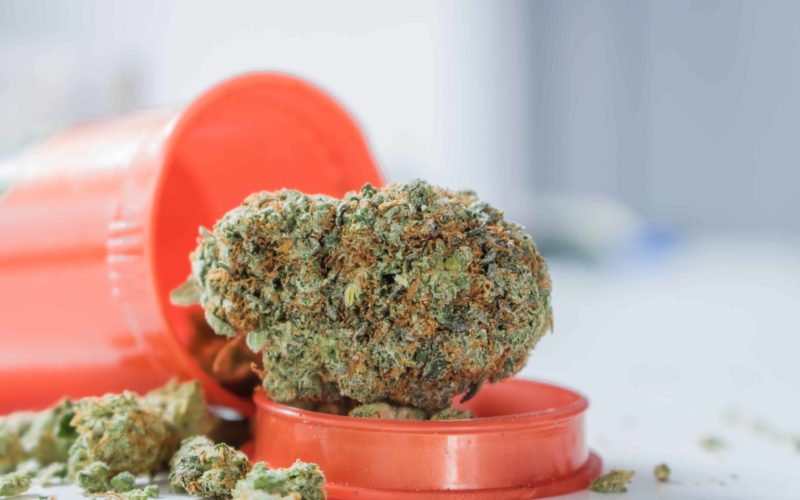Business
Australian Cannabis Patients Turning to Prescriptions Over Illicit Market, Study Shows

While Australia has yet to legalize recreational pot, the country has still seen its fair share of shifts since legalizing medicinal cannabis back in 2016.
New research from the University of Sydney’s Lambert Initiative seeks to take a closer look at cannabis consumers’ habits. The results found that most Australians medicate with illicit cannabis, though the number of patients accessing medicinal cannabis has risen dramatically over the years. The study’s findings were recently published in Harm Reduction Journal.
It’s the third Cannabis as a Medicine Survey (CAMS20), following two previous iterations, CAMS16 and CAMS18. The authors note that, even though Australia has had its legal framework for medicinal cannabis since 2016, prior surveys indicated most consumers were still using illicit cannabis products, while regulatory data indicated an increase in medicinal cannabis prescriptions since 2019.
Researchers administered a cross-sectional anonymous survey to 1,600 participants from September 2020 to January 2021. Participants were eligible if they were over 18 years of age, used cannabis for self-identified medical reason(s) in the past year, and a resident in Australia.
The survey ultimately found that 37.6% of respondents received a legal prescription for medical cannabis, a major increase from the 2.5% of respondents who reported prescription use in the 2018 iteration of the CAMS survey. Those who exclusively used prescription cannabis were often older, women, and less likely to be employed.
Prescribed participants were more likely to use cannabis to treat pain than those using illicit cannabis (52% vs. 40%) and were also less likely to treat sleep conditions (6% vs. 11%). Mental health conditions were also common indications for both groups (26% and 31%, respectively). Additionally, prescribed medicinal cannabis was predominately consumed through oral routes (72%), while illicit cannabis was more often smoked (41%).
As far as medicinal cannabis access, and despite the fact that medical patients in Australia have drastically increased over the past several years, few participants (10.8%) described the existing model for accessing prescribed medicinal cannabis as “straightforward or easy.”
Survey participants mostly called out the cost of medicinal cannabis as a barrier, with an average cost of $79 per week, highlighting the need to reexamine the cost of treatment for patients. People using illicit cannabis also reported that they had trouble finding medical practitioners with the ability or willingness to prescribe medicinal cannabis.
The study’s lead researcher, Professor Nicholas Lintzeris from the Faculty of Medicine and Health at the University of Sydney, said this data suggests that Australia has seen a transition from illicit use toward the legal use of medicinal cannabis.
“A number of benefits were identified in moving to prescribed products, particularly where consumers reported safer ways of using medical cannabis. People using illicit cannabis were more likely to smoke their cannabis, compared to people using prescribed products who were more likely to use oral products or vaporised cannabis, highlighting a health benefit of using prescribed products,” Lintzeris said.
Respondents also reported positive outcomes from their medical cannabis use overall, with 95% stating that using medical cannabis has improved their health.
Professor Iain McGregor, academic director of the Lambert Initiative for Cannabinoid Therapeutics, added that there are advantages in using medicinal cannabis instead of its illicit counterpart, including safer routes of administration, greater certainty of access, and better communication between patients and doctors.
“Patients can also be informed of the exact THC/CBD composition, which is an ongoing problem with illicit product,” McGregor said. “There should be further efforts to transition patients from illicit to regulated, quality-controlled, cannabis products.”
In the study conclusion, authors echo similar sentiments, noting the progress and uptick in medicinal cannabis prescriptions since the regulatory framework was first introduced in 2016. While they similarly note the benefits of using medicinal cannabis, authors recognized the barriers that may keep illicit cannabis users from securing a prescription.
In closing, the authors suggest further research to address the barriers respondents reported in accessing medical practitioners willing to prescribe medicinal cannabis in Australia. The CAMS series is conducted every two years, and if the stark contrast between this survey and the previous iteration is any indicator, hopefully the upcoming iteration will close some of these gaps in patient access to medicinal cannabis in the future.
Business
New Mexico cannabis operator fined, loses license for alleged BioTrack fraud

New Mexico regulators fined a cannabis operator nearly $300,000 and revoked its license after the company allegedly created fake reports in the state’s traceability software.
The New Mexico Cannabis Control Division (CCD) accused marijuana manufacturer and retailer Golden Roots of 11 violations, according to Albuquerque Business First.
Golden Roots operates the The Cannabis Revolution Dispensary.
The majority of the violations are related to the Albuquerque company’s improper use of BioTrack, which has been New Mexico’s track-and-trace vendor since 2015.
The CCD alleges Golden Roots reported marijuana production only two months after it had received its vertically integrated license, according to Albuquerque Business First.
Because cannabis takes longer than two months to be cultivated, the CCD was suspicious of the report.
After inspecting the company’s premises, the CCD alleged Golden Roots reported cultivation, transportation and sales in BioTrack but wasn’t able to provide officers who inspected the site evidence that the operator was cultivating cannabis.
In April, the CCD revoked Golden Roots’ license and issued a $10,000 fine, according to the news outlet.
The company requested a hearing, which the regulator scheduled for Sept. 1.
At the hearing, the CCD testified that the company’s dried-cannabis weights in BioTrack were suspicious because they didn’t seem to accurately reflect how much weight marijuana loses as it dries.
Company employees also poorly accounted for why they were making adjustments in the system of up to 24 pounds of cannabis, making comments such as “bad” or “mistake” in the software, Albuquerque Business First reported.
Golden Roots was fined $298,972.05 – the amount regulators allege the company made selling products that weren’t properly accounted for in BioTrack.
The CCD has been cracking down on cannabis operators accused of selling products procured from out-of-state or not grown legally:
- Regulators alleged in August that Albuquerque dispensary Sawmill Sweet Leaf sold out-of-state products and didn’t have a license for extraction.
- Paradise Exotics Distro lost its license in July after regulators alleged the company sold products made in California.
Golden Roots was the first alleged rulebreaker in New Mexico to be asked to pay a large fine.
Source: https://mjbizdaily.com/new-mexico-cannabis-operator-fined-loses-license-for-alleged-biotrack-fraud/
Business
Marijuana companies suing US attorney general in federal prohibition challenge

Four marijuana companies, including a multistate operator, have filed a lawsuit against U.S. Attorney General Merrick Garland in which they allege the federal MJ prohibition under the Controlled Substances Act is no longer constitutional.
According to the complaint, filed Thursday in U.S. District Court in Massachusetts, retailer Canna Provisions, Treevit delivery service CEO Gyasi Sellers, cultivator Wiseacre Farm and MSO Verano Holdings Corp. are all harmed by “the federal government’s unconstitutional ban on cultivating, manufacturing, distributing, or possessing intrastate marijuana.”
Verano is headquartered in Chicago but has operations in Massachusetts; the other three operators are based in Massachusetts.
The lawsuit seeks a ruling that the “Controlled Substances Act is unconstitutional as applied to the intrastate cultivation, manufacture, possession, and distribution of marijuana pursuant to state law.”
The companies want the case to go before the U.S. Supreme Court.
They hired prominent law firm Boies Schiller Flexner to represent them.
The New York-based firm’s principal is David Boies, whose former clients include Microsoft, former presidential candidate Al Gore and Elizabeth Holmes’ disgraced startup Theranos.
Similar challenges to the federal Controlled Substances Act (CSA) have failed.
One such challenge led to a landmark Supreme Court decision in 2005.
In Gonzalez vs. Raich, the highest court in the United States ruled in a 6-3 decision that the commerce clause of the U.S. Constitution gave Congress the power to outlaw marijuana federally, even though state laws allow the cultivation and sale of cannabis.
In the 18 years since that ruling, 23 states and the District of Columbia have legalized adult-use marijuana and the federal government has allowed a multibillion-dollar cannabis industry to thrive.
Since both Congress and the U.S. Department of Justice, currently headed by Garland, have declined to intervene in state-licensed marijuana markets, the key facts that led to the Supreme Court’s 2005 ruling “no longer apply,” Boies said in a statement Thursday.
“The Supreme Court has since made clear that the federal government lacks the authority to regulate purely intrastate commerce,” Boies said.
“Moreover, the facts on which those precedents are based are no longer true.”
Verano President Darren Weiss said in a statement the company is “prepared to bring this case all the way to the Supreme Court in order to align federal law with how Congress has acted for years.”
While the Biden administration’s push to reschedule marijuana would help solve marijuana operators’ federal tax woes, neither rescheduling nor modest Congressional reforms such as the SAFER Banking Act “solve the fundamental issue,” Weiss added.
“The application of the CSA to lawful state-run cannabis business is an unconstitutional overreach on state sovereignty that has led to decades of harm, failed businesses, lost jobs, and unsafe working conditions.”
Business
Alabama to make another attempt Dec. 1 to award medical cannabis licenses

Alabama regulators are targeting Dec. 1 to award the first batch of medical cannabis business licenses after the agency’s first two attempts were scrapped because of scoring errors and litigation.
The first licenses will be awarded to individual cultivators, delivery providers, processors, dispensaries and state testing labs, according to the Alabama Medical Cannabis Commission (AMCC).
Then, on Dec. 12, the AMCC will award licenses for vertically integrated operations, a designation set primarily for multistate operators.
Licenses are expected to be handed out 28 days after they have been awarded, so MMJ production could begin in early January, according to the Alabama Daily News.
That means MMJ products could be available for patients around early March, an AMCC spokesperson told the media outlet.
Regulators initially awarded 21 business licenses in June, only to void them after applicants alleged inconsistencies with how the applications were scored.
Then, in August, the state awarded 24 different licenses – 19 went to June recipients – only to reverse themselves again and scratch those licenses after spurned applicants filed lawsuits.
A state judge dismissed a lawsuit filed by Chicago-based MSO Verano Holdings Corp., but another lawsuit is pending.
Source: https://mjbizdaily.com/alabama-plans-to-award-medical-cannabis-licenses-dec-1/
-

 Business2 years ago
Business2 years agoPot Odor Does Not Justify Probable Cause for Vehicle Searches, Minnesota Court Affirms
-

 Business2 years ago
Business2 years agoNew Mexico cannabis operator fined, loses license for alleged BioTrack fraud
-

 Business2 years ago
Business2 years agoAlabama to make another attempt Dec. 1 to award medical cannabis licenses
-

 Business2 years ago
Business2 years agoWashington State Pays Out $9.4 Million in Refunds Relating to Drug Convictions
-

 Business2 years ago
Business2 years agoMarijuana companies suing US attorney general in federal prohibition challenge
-

 Business2 years ago
Business2 years agoLegal Marijuana Handed A Nothing Burger From NY State
-

 Business2 years ago
Business2 years agoCan Cannabis Help Seasonal Depression
-

 Blogs2 years ago
Blogs2 years agoCannabis Art Is Flourishing On Etsy













